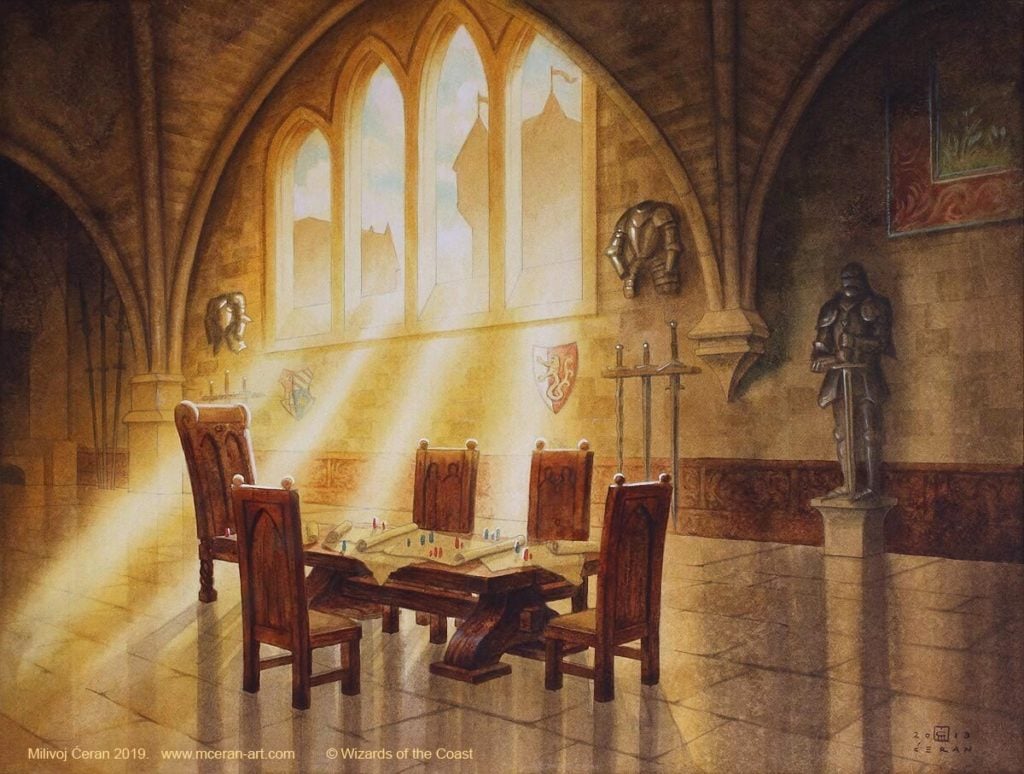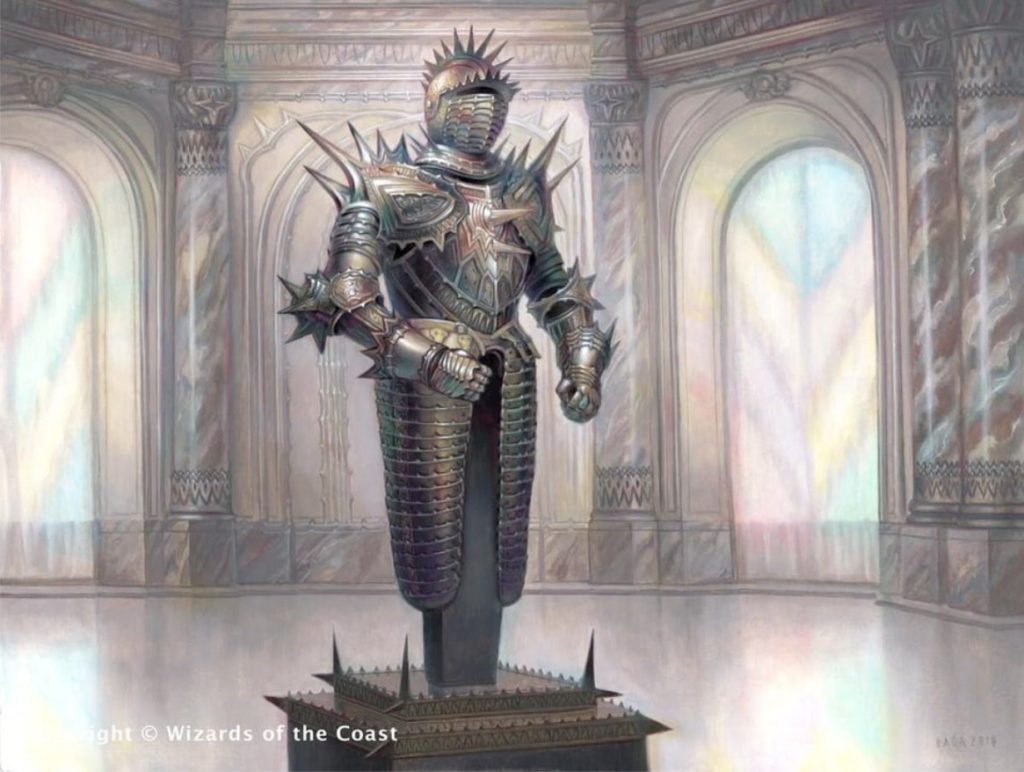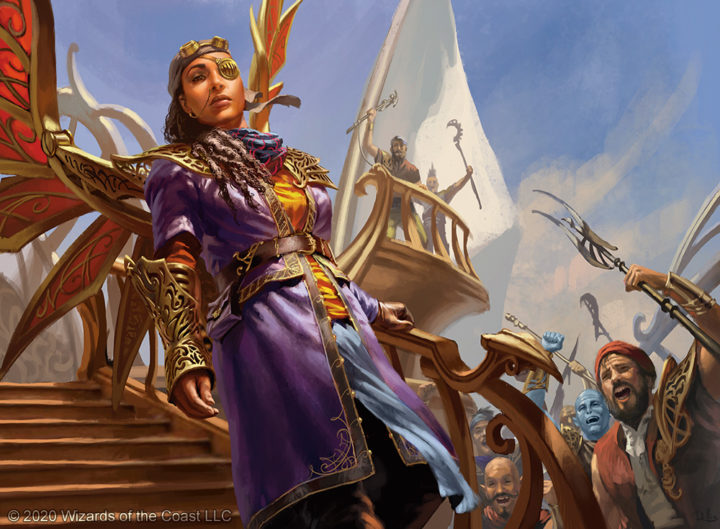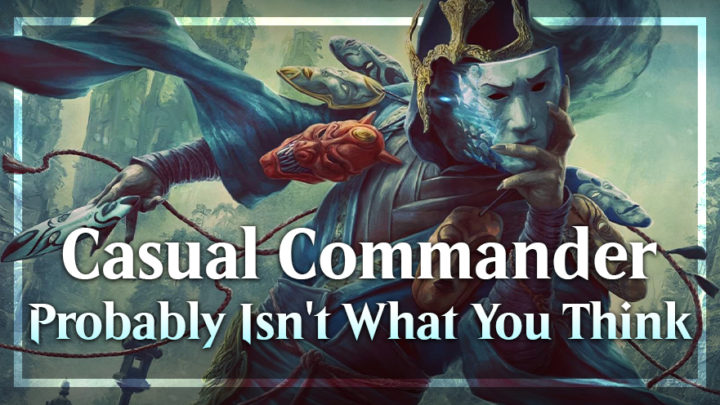Chances are that when you sit down for a game of Commander, it’s going to be “casual.” That only really holds true, though, if your definition of “casual” is strictly “not competitive.” Overwhelmingly, the non-competitive players outnumber those who want to push things to the limits, but the truth of the matter is that “casual” is a far more nebulous term.
Casual to some involves thematic, “janky” decks; to others, it means playing with strong Magic cards in an environment where the winner emerges no sooner than turn 10 or so, and where combos are considered unsporting; to others still, it means only that decks be less powerful than cEDH decks.
The definition of “casual” Commander has been a pervasive topic lately, and one that seems to be surfacing more and more frequently. It might be bold to surmise, but I do feel that one of the reasons for this is that patience is starting to wear thin for people stuck inside in lockdowns, and naturally, people are tolerating minor miscommunications less and less. It’s also probably because the format is speeding up and becoming more streamlined — if you’re not on that highway, then you’re falling behind, and it can be a pretty rough experience when things don’t line up.
The thing is, though, whether you’re lucky enough to have a regular playgroup or not, you have to ask the question: how casual even is Commander?

The Commander Content Sphere
Commander was born as a casual format, but it’s hard to agree that that moniker fits entirely nowadays. Ever since Commander content started kicking off at the start of the decade, content has primarily been about optimization. For every “Commander’s Sphere” — a casual podcast I highly recommend you check out — there’s another two dozen channels, writers or podcasts that focus entirely on improvement and progress.
Indeed, almost everything we consume in the Magic content-sphere drives us away from the idea of “casual.” Whether it’s the cards that are considered playable, the archetypes that are least likely to crash and burn, or the “recommended” numbers for board wipes, ramp and removal — the very pillars of the format — they all seek to optimize.
And optimization is the key, is it not? Well, it is for many players, and it’s little wonder that “optimized” is a term used in rating scales to describe a high-level deck, usually one up from “focused.” At the end of the day, people love to win games, but more than that, they want the deck that they’ve put effort into — the deck they’ve put money into — to actually perform.
I don’t think that’s an unreasonable goal, given Magic as a game is gated, to a degree, on price of admission. While budget decks are entirely buildable, not all decks are created equally, and you can see that more literally in how expensive it can be to put together a white-based deck that can keep up with other budget decks. The staples are just expensive, and there’s no way around it — something I touched on when putting together my Wyleth, Soul of Steel budget upgrade guide.

The Correct play, or the Misplay
Beyond their decks, players also seek to optimize their play. I’ve spoken at length before about how playing Limited can make you a better Commander player, and I still hold true to that. The cards you play, individually, do matter less than the way you play them. If it’s not the optimal or safe play, then it’s far harder to justify, right?
The thing is, though, playing like that every game can lead to making the “fun” play far less frequently than you might like to. Whether it’s a janky sorcery or a tricksy piece of interaction, or even a beatstick with less synergy, you’ll cast the risky, situational, or pet cards — the “casual” cards — less often when you’re zoned in on playing optimally.
I’ll admit right away that this is how I like to play, and I justify it by putting restrictions on what I have access to. As someone who has historically played a lot of Boros, one of the color pairings with the least flexibility when it comes to riding out games, I’ve learned to enjoy the challenge.

In other decks, for instance, I place a similar “gating” of power level. My Jolrael, Mwonvuli Recluse build, for instance, is decidedly budget, eschewing powerful cards like Sylvan Library and Seedborn Muse. As far as bursty draw, I took only Return of the Wildspeaker and Freyalise, Llanowar’s Fury (who even needs to ult to enable this!). I also limited the resilience of the deck by only allowing Heroic Intervention and Praetor’s Counsel when it came to protection and recursion. By limiting the tools available to me, and lowering the deck’s recursive power, it aims to be far easier to interact with, and ultimately, less powerful.

Despite getting my fun out of casting Wolfcaller’s Howl and Provoke, I’ve found the deck’s win rate is still pretty high. Though some of this is down to how nearly 50% of the cards in the deck involve the words “draw a card,” and some down to how strong Jolrael can be, a large part of this is due to my skill as a player.
Far be it from me to overstate my abilities — I make and note misplays in every game like the best of us — but I am pretty good with sequencing and politics. I can clean up a draft at my LGS with the most medium of decks, and playing Boros has made me keenly aware of the importance of preventing the table from hitting a “Buckaroo” moment. My threat assessment is generally on point, and I can, at times, be merciless about putting a player back into the stone-age.
My point is that I’m not alone, and chances are, you will have a good amount of skill as a Magic player, too. We talk often about people overestimating their skill and knowledge, sure, but I’m highlighting today how underestimating that skill and knowledge can contribute to creating an environment that is less “casual.”
Even if you have a lower-powered deck with plenty of fun cards and stick to a strong theme, if your goal is to play optimally, you might not be cultivating the casual environment you hope for. I’ve often prefaced plays with “this isn’t the optimal play, but it’s fun,” and I only wish that I could utter that phrase more often.

For some, though, casual games of Commander are the only games of Magic they can get. Especially in a pandemic with no events on locally, and friend groups separated, people’s access to games is less free than it once was. Throw in a lack of overall time to play, and you end up with a perfect storm: casual players who like to win, with decks they’ve invested in, who don’t necessarily have time for more than a couple of games. Is it any wonder that they place building and playing optimally so highly?
I think that, though there are things which can be done — things I’ll cover in a moment — we do need to cut people some slack when it comes to figuring out how to line up their definitions of “casual.” We’re all aware that it takes multiple games for a new playgroup to figure out where things lie, and that game #1 is often more about seeing how far off people are when it comes to that alignment. That same patience should be extended to figuring out what “casual” means, too. And if it means different things to different people? That’s okay.
One of the biggest developments I’ve seen in this emergent discussion happened over the summer, and I don’t think we’ve managed to put it more elegantly since: non-competitive Commander can be broken down into both “Casual” and “Social.” It seems to me that Social is the more accurate term for what many mean by “casual” — the desire for table fun, and everyone getting to experience highs and lows, with plays made primarily for fun rather than optimization. I think we could do with adopting that term more aggressively, as it does a lot to clear up confusion about what “casual” means.

Putting the Casual back into Commander
So, how do you get closer to Casual, when you’re a good Magic player that builds decks on auto-pilot, agonizing over cuts because you know, deep down, what’s optimal?
Well, there are a couple of things you can do. The first is to build a deck that’s focused primarily on fun gameplay. Though we all are well versed in “downgrading” our decks after winning a game in the pod, it’s possible that doing this isn’t quite enough to even out your potential to win games handily.
While group-hug decks may not be for everyone, there are still lessons to take away from that style of deck. Don’t be afraid to embrace variance, random chance, or giving other players resources or decisions to make. You don’t need to be in a Queen Marchesa Monarch Aikido deck for this to work, and honestly? That kind of deck is still built to win, primarily.

What I mean to suggest is to run more cards like Dire Fleet Daredevil and Dualcaster Mage to copy big dumb spells. Take Skullwinder and Pulsemage Advocate instead of Eternal Witness and Karmic Guide. Run that Mindclaw Shaman you’ve always thought had too low a floor. Play Head Games purely to enable someone else’s cool strategy.

Further than that, ignore some of those deck-building heuristics that restrict your decision-making. Drop a couple removal or ramp spells for some more exciting and situational cards. This goes double when you’re building a theme deck. Sure, for some themes, there just aren’t the cards to build optimally, like in mono-white, for instance. On a lot of occasions, I do add “good stuff” cards like Sun Titan to every build. But when building a more casual deck? Run that janky six-drop instead.
Just as not every deck in your collection has to be optimized, not every deck has to run sub-optimal cards, either. If you’re lucky enough to have the spare cards for multiple decks, then make sure to include a “foot-off-the-pedal” deck to switch to from time to time that isn’t just “less powerful” than your main decks. Heck, make taking your foot off the pedal more akin to Wacky Races than Formula 3, and you’re bound to be onto a winner.
After having played a lot of SpellTable Commander this year, I can honestly say that I feel my collection of decks is lacking more of those truly casual decks. Whether that’s because they were built for an LGS-meta that is currently on hold, or because I build my decks to those ingrained heuristics… Well, it varies. I do know that I’d like to make a start on some jankier builds with a little more variance, though — and maybe variance is a good place to start. In every other arena of Magic, variance is tuned out. In casual Commander, though? Maybe turning that dial up a notch is a good plan.
Ultimately, casual Commander means different things to different people. You’re never going to come up with a definition, ruleset or heuristic that’s more efficient or productive than simply having a conversation.
What you can do to make the process more fun for everyone, though, is to relax a little and inject a little whimsy to your game. Winning is fun, and playing optimally is fun, and I don’t want to take that away from you. I’m just going to suggest that there are many hats to wear, and sometimes playing casually requires a different hat, and not just a different deck.
What does casual Commander mean to you? Let me know on Twitter.

Kristen is Card Kingdom’s Head Writer and a member of the Commander Format Panel. Formerly a competitive Pokémon TCG grinder, she has been playing Magic since Shadows Over Innistrad, which in her opinion, was a great set to start with. When she’s not taking names with Equipment and Aggro strategies in Commander, she loves to play any form of Limited.

